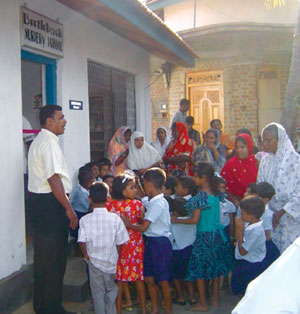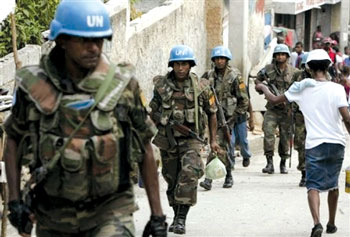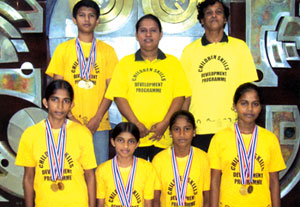
A tobacco-free society
Some of you may get a shock to hear that there are children like you
who smoke. It may be hard to believe, but it definitely is the truth!
There are millions of children and youth all over the world including in
Sri Lanka, that have fallen victim to this dreaded scourge(severe
affliction).

It is to bring attention to this problem that this year’s World No
Tobacco Day, which is observed on May 31, has been organised under the
theme ‘Tobacco-free Youth’.
According to the World Health Organization (WHO), tobacco is the
leading preventable cause of death in the world. It is also said to be
the only legal consumer product that kills one third to half of those
who use the product as intended by the manufacturers; the victims also
die 15 years prematurely.
The global youth population, which comprises those between the ages
of 10 and 24, stands at 1.8 billion, with 85 per cent of them in the
developing world.
A significant number of them have already fallen victim to smoking.
Nicotine is a highly addictive substance. Youth and children are highly
vulnerable to such dangerous substances as they love to experiment. Peer
pressure is also a major factor.
It’s a well-known fact that most smokers start this habit in their
teenage years, around the age of 18. A significant number of them are
said to start around the age of 10. The younger they start, the more
difficult they will find it to give up the habit later in life. They
will also be more vulnerable to diseases brought on as a result of
smoking.
More youth are expected to take up smoking as the tobacco industry
intensifies its marketing activities. The industry is believed to spend
over 10 billion US dollars worldwide annually for marketing purposes.
Governments can do a lot towards minimising this problem by banning
direct and indirect advertising, promotion of tobacco products and
sponsorship of various events and activities by the industry. Many
countries that have introduced legislation to ban smoking in public
places have seen lowered levels of tobacco consumption.
The World No Tobacco Day will encourage countries and governments to
work towards the implementation of strict regulation of tobacco
products, by raising awareness about the existence of the many different
varieties of products in the market.
Such regulation will help people get more accurate information,
remove disguises and unveil the truth behind all tobacco products,
whether traditional, new or future.
However, legislation won’t help unless the public realise the danger
of tobacco and smoking. They should be aware of the impact this bad
habit has on their health, economy and society. Then only will we be
able to rid society of this menace(threat).
Programme to improve education in the East
A programme to improve the quality of primary and secondary education
in schools and other institutions in the Eastern Province has been
launched by the Education Ministry.

The programme would see six schools in each of the three districts of
the province being developed under the Isuru schools programme this
year.
Vivekananda Maha Vidyalaya has already being allocated Rs. 28
million, while Rs. 10 million has been allocated to Trincomalee
Vendrasan Vidyalaya under the Secondary School Development Project.
Development work in connection with this project was launched last year.
Nineteen schools in the North and East are earmarked for development
this year under the new Model Primary School Development Project.
Eleven schools had been developed in these provinces in 2006 while 19
had been developed last year. Funds worth Rs. 4,893.1 million had been
spent by the Ministry to develop 103 tsunami-affected schools in the
Ampara, Batticaloa and Trincomalee districts.
Meanwhile, as a means of easing the teacher shortage, 1,088 graduate
teachers were appointed to schools in these areas under the Tharuna
Aruna programme. There are around 974 schools in the Eastern Province,
and noon meals are currently being provided to students in 934 schools.
A large number of displaced students including 2,467 students in the
Batticaloa Education Division had also been re-admitted to schools under
this programme.
Peacekeepers to the world
There are wars and various other conflicts taking place all over the
world. Some of these warring parties, after years of strife, have still
managed to find peace, while others have not, resulting in continued
violence and bloodshed.

In helping strife-torn countries create conditions of lasting peace,
the United Nations Peacekeeping mission has played a leading role. Do
you know what these UN Peacekeeping Forces are?
They are forces personnel derived from UN member states and deployed
to conflict areas in different parts of the world to maintain peace.
Such personnel are honoured on May 29, which is the International Day of
UN Peacekeepers.
The day was declared by the UN General Assembly in 2002, to pay
tribute to all the men and women who have served and continue to serve
in UN peacekeeping operations, for their high level of professionalism,
dedication and courage, and to honour the memory of those who have lost
their lives in the cause of peace.
May 29 is the date in 1948 that the first UN peacekeeping mission,
the UN Truce Supervision Organization, began operations in the Middle
East to monitor the Armistice Agreement between Israel and its Arab
neighbours. Since then, the UN has deployed 63 such missions in
different parts of the world.
One of the prime objectives of the United Nations, as declared in its
Charter, is “to save succeeding generations from the scourge of war”.
Its peace operations have been designed with this objective in mind and
incorporates three principal activities: conflict prevention and
peacemaking, peacekeeping, and peacebuilding.
The role of peacekeepers has undergone vast changes over the years,
evolving to suit the demands of different conflict situations and
changing political landscapes. Earlier, their task mainly comprised
lightly armed troops monitoring, reporting and taking
confidence-building roles to support ceasefires and peace agreements.
Now, their roles have expanded to include building sustainable
institutions of governance, human rights monitoring, security sector
reforms, disarmament, demobilisation and reintegration of former
combatants. The nature of conflicts have also changed from mostly
inter-state conflicts in the early eras to intra-state conflicts and
civil wars.
Medals for Lankan students
Several Sri Lankan students managed to win medals at the cultural
show organised by India’s Don Bosco Wisdom Town insitutute of Chennai in
association with Sri Lanka’s Children Skills Development Programme (CSDP),
in India.
|

The medal winners are seen here with CSDP Director, Rathna
Pushpa Kumari and Programme Advisor, Maithreepala Silva, who
is the principal of C.W.W. Kannangara Vidyalaya. |
The medal winners were W. Ashini Nilanka Perera of Siddhartha Maha
Vidyalaya, Thalapathpitiya (gold medal for dancing); M. Shalitha Eranda
Pieris of Ananda College, Colombo (bronze for dancing and silver for
singing); S.M. Kujani Vimansha Karunaratne of Ranpokunagama Maha
Vidyalaya, Nittambuwa (gold for singing); W.A. Chamodani Chathurangi of
Kumara Vidyalaya, Kotahena (bronze for singing); and H.A. Pradeepa
Piumali of C.W.W. Kannangara Vidyalaya, Colombo 8 (silver for general
knowledge).
Meanwhile, the CSDP has extended the closing date for applications
for the World Environment Day competitions, which it is organising for
the 12th year.
Accordingly, applications for the art, poster, essay, song and poetry
compositions, advertising pamphlets, creating novel items and cards out
of waste for the Pre-school, Under 12 and Over 12 groups will be
accepted till May 25.
Applications for the short plays, new dance creations, singing,
dancing, speech and announcing competitions will be accepted from 9am to
12pm on May 31 at C.W.W. Kannangara Vidyalaya, Colombo 8. |
